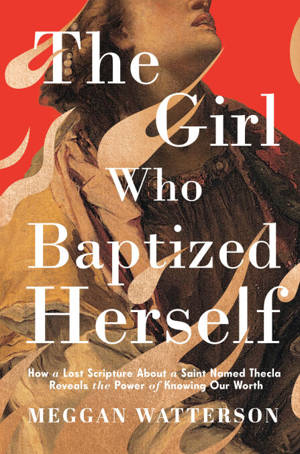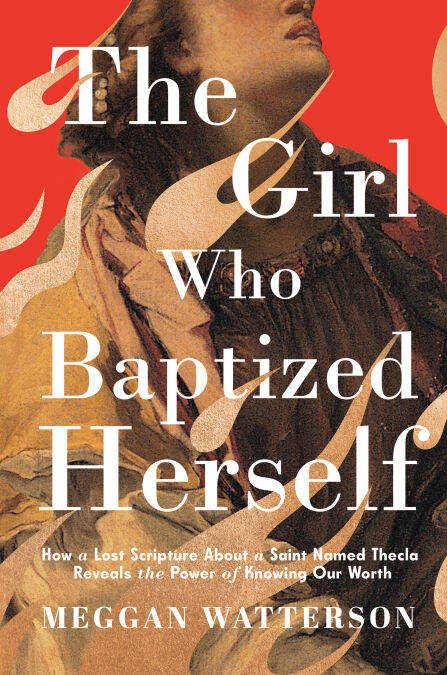
Je cadeautjes zeker op tijd in huis hebben voor de feestdagen? Kom langs in onze winkels en vind het perfecte geschenk!
- Afhalen na 1 uur in een winkel met voorraad
- Gratis thuislevering in België vanaf € 30
- Ruim aanbod met 7 miljoen producten
Je cadeautjes zeker op tijd in huis hebben voor de feestdagen? Kom langs in onze winkels en vind het perfecte geschenk!
- Afhalen na 1 uur in een winkel met voorraad
- Gratis thuislevering in België vanaf € 30
- Ruim aanbod met 7 miljoen producten
Zoeken
The Girl Who Baptized Herself E-BOOK
How a Lost Scripture About a Saint Named Thecla Reveals the Power of Knowing Our Worth
Meggan Watterson
E-book | Engels
€ 16,18
+ 16 punten
Uitvoering
Omschrijving
This riveting exploration of a nearly lost first-century scripture tells the story of a courageous saint named Thecla and offers us a road map to knowing our worth.
“Meggan Watterson writes with a prophet’s vision and a mystic’s heart.”—Arianna Huffington, founder and CEO, Thrive Global
A teenage girl named Thecla is sitting at her bedroom window listening to a man share stories nearby. Her mother and fiancé order her to stop. But Thecla, trapped in a world that expects her to marry and have children, refuses. This man, Paul, is talking about a world she wants to believe in: an inner world of freedom to define her own life. And he’s talking about a kind of love she hasn’t known before—a love that asks her to be true to who she is within.
For Meggan Watterson, a Harvard-trained feminist theologian, Thecla’s story in The Acts of Paul and Thecla has everything to do with power. Thecla’s refusal to be controlled, as well as the authority she reclaims by baptizing herself, reads like a lost gospel for finding our own source of power within—a power that allows us to know who we are and to make choices based on that knowing. This hidden scripture suggests that Christianity before the fourth century was about defying the patriarchy, not deifying it. But early church fathers excluded The Acts of Paul and Thecla, along with other sacred texts such as The Gospel of Mary, from the New Testament.
Watterson synthesizes scripture, memoir, and politics to illuminate a story that has been left out of the canon for far too long, one that follows a girl freeing herself from a life predicated on the expectations of others—a path that made her feel unworthy. Thecla’s story offers us a path to take back the power we often give to others and live based on the truth of who we are.
“Meggan Watterson writes with a prophet’s vision and a mystic’s heart.”—Arianna Huffington, founder and CEO, Thrive Global
A teenage girl named Thecla is sitting at her bedroom window listening to a man share stories nearby. Her mother and fiancé order her to stop. But Thecla, trapped in a world that expects her to marry and have children, refuses. This man, Paul, is talking about a world she wants to believe in: an inner world of freedom to define her own life. And he’s talking about a kind of love she hasn’t known before—a love that asks her to be true to who she is within.
For Meggan Watterson, a Harvard-trained feminist theologian, Thecla’s story in The Acts of Paul and Thecla has everything to do with power. Thecla’s refusal to be controlled, as well as the authority she reclaims by baptizing herself, reads like a lost gospel for finding our own source of power within—a power that allows us to know who we are and to make choices based on that knowing. This hidden scripture suggests that Christianity before the fourth century was about defying the patriarchy, not deifying it. But early church fathers excluded The Acts of Paul and Thecla, along with other sacred texts such as The Gospel of Mary, from the New Testament.
Watterson synthesizes scripture, memoir, and politics to illuminate a story that has been left out of the canon for far too long, one that follows a girl freeing herself from a life predicated on the expectations of others—a path that made her feel unworthy. Thecla’s story offers us a path to take back the power we often give to others and live based on the truth of who we are.
Specificaties
Betrokkenen
- Auteur(s):
- Uitgeverij:
Inhoud
- Aantal bladzijden:
- 288
- Taal:
- Engels
Eigenschappen
- Productcode (EAN):
- 9780593595015
- Verschijningsdatum:
- 21/07/2025
- Uitvoering:
- E-book
- Beveiligd met:
- Adobe DRM
- Formaat:
- ePub

Alleen bij Standaard Boekhandel
+ 16 punten op je klantenkaart van Standaard Boekhandel
Beoordelingen
We publiceren alleen reviews die voldoen aan de voorwaarden voor reviews. Bekijk onze voorwaarden voor reviews.









